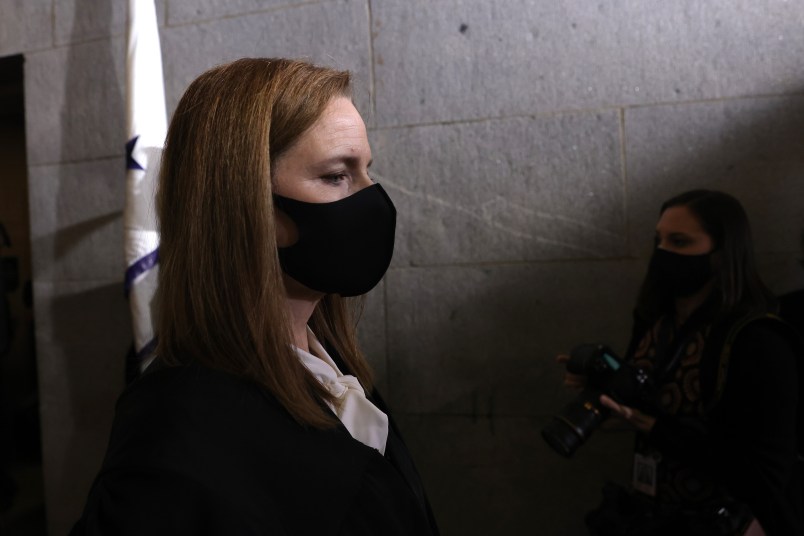When Justice Amy Coney Barrett was confirmed to the Supreme Court in October 2020, the anti-abortion community celebrated the beginning of a new era. The Court would now be heavily skewed to the right, and its newest member had been open about her own beliefs.
“It’s go time! Get ready for a post Roe v Wade America! #ProLifeGen Assemble! This is what we were made for and have been preparing for,” tweeted the president of the anti-abortion group Students for Life.
That was six months ago. The hammer still hasn’t dropped.
At first, the assumption among the anti-abortion crowd was that the delay was innocuous: Barrett was simply getting caught up on the caseload.
Now, it’s starting to cause uncertainty.
“She’s been on the Court long enough now that I think an alternative explanation is needed,” Walter Weber, senior counsel at the Christian-based, conservative American Center for Law & Justice, told TPM.
The Court has had the chance to take up an abortion case for the entirety of Barrett’s tenure. It first scheduled Dobbs v. Jackson Women’s Health Organization, a case centered on a 15-week abortion ban out of Mississippi, for conference at the end of September 2020. That case has since been relisted 18 times.
“I don’t know the record for relisting, but we have to be close,” said David Cohen, professor at Drexel University’s Thomas R. Kline law school and author of “Obstacle Course: The Everyday Struggle to Get an Abortion in America.”
The Court is an opaque, generally leak-proof institution, and interpreting its silence on this case requires some speculation.
While nothing is certain — the Court could suddenly take action on the issue as soon as this week — the lengthy delay has the anti-abortion contingent concerned. What started as an unabashed jubilance at the elevation of another conservative justice — one who was formerly a member of University Faculty for Life at Notre Dame, for goodness’ sake — has cooled into a long, anxious wait. And doubts are creeping in.
“The Court is going to deny review, and a Justice is preparing a dissent,” Weber suggested as a possible cause for the lag. “This is, statistically speaking, the most likely explanation for any delay in announcing an order.”
He offered up a gamut of other possible explanations: maybe the Court is waiting for another case that would represent a more gradual evolution in the law. Maybe it’s kicking the politically-explosive can to the end of term, in June or early July. Maybe Justice Stephen Breyer is planning to retire at the end of this term, and the Court is reluctant to let this case inflame the confirmation process for his successor.
“I’m baffled. Frankly, I think everyone is baffled,” said Jessie Hill, associate dean and professor at Case Western Reserve University law school who formerly worked as a lawyer for the ACLU’s Reproductive Freedom Project. “I don’t know what to make of the Court’s failure to act on the Mississippi petition. This case is clearly the conservative majority’s best opportunity at the moment to overturn Roe v. Wade.”
Meanwhile, the Court did sort of agree to hear another abortion case, this time out of Kentucky, called Cameron v. EMW Women’s Surgical Center — but only on the technical question concerning whether the state’s attorney general, a Republican, can defend the state’s restrictive abortion law against the wishes of the Democratic governor. The Court declined to take up an additional question about the underlying law itself, which would have provided a more direct path for the justices to address the abortion access piece of the case.
To Hill, that decision suggests two options: either the Court is “staying out of the abortion fray for now,” or it’s poised to deliver a significant blow to abortion protections by taking up the Mississippi case and upholding its 15-week ban.
Michael New, research associate at Catholic University and self-described conservative Catholic, pointed out that the Court’s usual preferences may incline them towards the former.
“The U.S. Supreme Court tends to be a small ‘c’ conservative institution whose decisions are more likely to reinforce that status quo than result in significant policy changes,” he said.
It’s all educated guesswork until the Court takes action on the case one way or another. But if it does ultimately deny the case, Weber predicts that it’ll send a major signal to the anti-abortion community.
“It would show that there is not yet sufficient courage or will on the Supreme Court to confront this issue,” he said. “That’s bad news especially because the Court is not gonna get better in pro-life terms under Biden.”







But what does he think will happen if the current Court overturns Roe v. Wade? Might that not be precisely the kick in the head Congress needs to take up “reform” of SCOTUS?
If this holds and Amy Covid Bigot ain’t the wunderkid that MoscowMitch prayed for, maybe we’ll have dodged a bullet because in his haste to fill the seat while he had the chance, MoscowMitch of necessity had to cut corners and wouldn’t be able to do that long deep dive into whether she was the real deal or just using the federalists to get ahead.
The dog was never supposed to catch the car. And now the conservatives on the Court can’t figure out how to make it go away.
I’m sure Roberts understands that the very legitimacy of the Court is on the line and yet they are damned if they do and damned if they don’t.
Sadly, probably not. But it’s clear that the warriors on the court have spinal similarities to their invertebrates in the Senate. John Roberts, voting lately with the liberals, is probably paralyzed with fear to bring this up.
Why do people keep saying that like the court has had any legitimacy since Bush v. Gore, at a minimum…